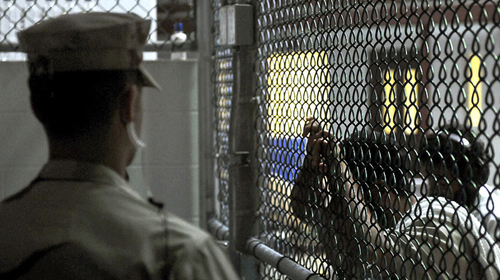
GUANTÁNAMO BAY, Cuba — What would it take for you to trust a stranger with your life?
For most of us, this question is merely rhetorical, but for criminal defendants facing the death penalty, it could not be more concrete. To be effective in pursuit of a just criminal process, the lawyers who defend these individuals must work extraordinarily hard — often for many years— to earn their clients' trust. Before this fundamental trust is born, these attorneys and clients must frequently bridge yawning divides across race, culture, education, politics, religion, and more. Only then, secure in the commonality of purpose that characterizes the most successful attorney–client relationships, can a lawyer navigate with confidence the messy facts, complex law, and highly charged emotions that characterize death-penalty trials.
Here at the Guantánamo Bay military commission convened to try five of the alleged plotters behind the September 11, 2001 attacks, the difficulty of this process is amplified by the conditions under which the commission's charges are being litigated. The defendants were tortured by the same government that is now trying them in a makeshift military courtroom. Extreme rules governing classification and official secrecy prevent defense lawyers from showing (or even explaining to) their clients important evidence and legal motions. Lawyers cannot call their clients, and visits to the base — more than 1,300 miles from Washington, D.C. — are logistically difficult and time-consuming. Hearings are held roughly four days every two months.
Yet the government keeps choosing to make matters worse.
A series of troubling events — CIA censorship of the proceedings from outside the courtroom; the disappearance of files from defense-counsel hard drives; the installation of listening devices, hidden in smoke detectors, in attorney–client meeting rooms — have raised grave concerns about whether the defense teams and their clients can be assured of the integrity of the attorney–client relationship. And on Monday, defense lawyers revealed that they are apparently the subjects of an investigation by the Federal Bureau of Investigation — and that at least one defense team member, a Defense Security Officer for the team defending Ramzi bin al Shibh, has been approached by the FBI for information and gagged by a non-disclosure agreement.
Defense lawyers have asked for an independent inquiry by the military commission into the circumstances of the FBI investigation, which reportedly centers on the publication early this year of a series of letters written by 9/11 defendant Khalid Sheikh Mohammed. They argue that only after the court examines the facts surrounding the DSO interview — and any other FBI contact with members of the defense teams — can they determine whether they are faced with a conflict of interest that would undermine the effective representation of their clients. Judge Pohl seems inclined to agree; in court today, he raised the possibility that, perhaps as soon as next week, he would appoint independent counsel to any of the accused whose defense has now been implicated by a potential attorney–client conflict of the government's making.
As David Nevin, lead attorney for Khalid Sheikh Mohammed, explained in court on Tuesday, there are only two roads ahead: "One of them is that I go, and that anybody who is subject to the investigation goes also; and the other is that Mr. Mohammed waives the conflict after being independently advised." The four other defense teams and their clients confront the same issue.
This is what the government has wrought, but is this really what it wants? Here at Guantánamo, trust is especially delicate, and it now appears to be in serious jeopardy. To lose the representation of the 9/11 defendants' lawyers now would do perhaps insurmountable damage to this prosecution. The lawyers and their teams have spent almost five years with their clients, proving to them in deed and effort that their devotion to the principle that all individuals are entitled to a vigorous, effective defense translates even to these defendants, even in this place.
Could a new set of lawyers ever earn this same trust? And if not, what then?
Learn more about Guantánamo Bay and other civil liberty issues: Sign up for breaking news alerts, , and .

